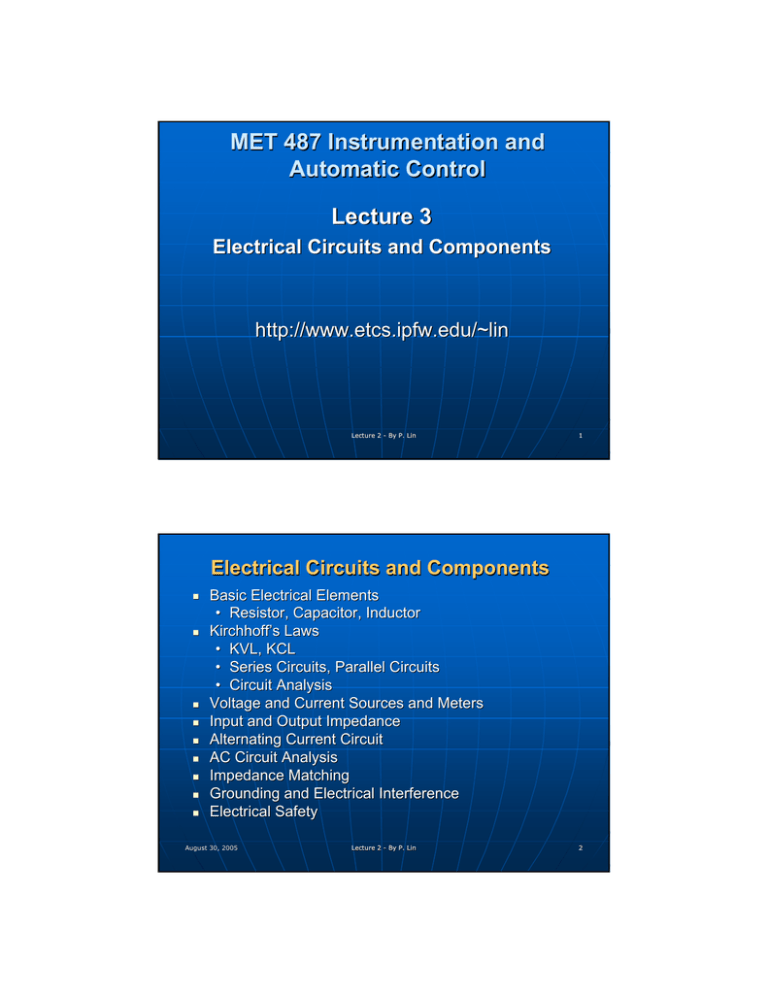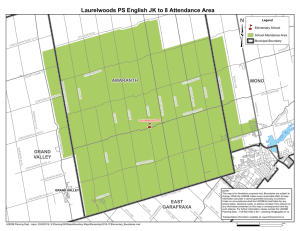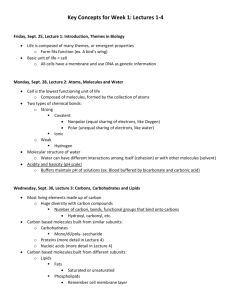Color - IPFW.edu
advertisement

MET 487 Instrumentation and Automatic Control Lecture 3 Electrical Circuits and Components http://www.etcs.ipfw.edu/~lin Lecture 2 - By P. Lin 1 Electrical Circuits and Components Basic Electrical Elements • Resistor, Capacitor, Inductor Kirchhoff’ Kirchhoff’s Laws • KVL, KCL • Series Circuits, Parallel Circuits • Circuit Analysis Voltage and Current Sources and Meters Input and Output Impedance Alternating Current Circuit AC Circuit Analysis Impedance Matching Grounding and Electrical Interference Electrical Safety August 30, 2005 Lecture 2 - By P. Lin 2 Basic Electrical Elements Resistor Ohm’ Ohm’s Law: V = I*R, I = V/R, R = V/I Wire Resistance L R=ρ A Example: find the resistance of a copper wire: 1.0 mm in diameter, 10 m long Solution: ρ = 1.7x10-8 Ωm, D = 0.0010m, r = D/2, L = 10m A = π r2 = π (D2/4) = 7.8 x 10-7 m2 R = ρ L/A = 0.22 Ω August 30, 2005 Lecture 2 - By P. Lin 3 Color Coded Resistor Lecture 2 - By P. Lin 4 Color Coded Resistor - Examples August 30, 2005 Lecture 2 - By P. Lin 5 Series Resistors Rt = R1 + R2 sum of resistance (ohms) • Rt = 100 + 120 = 220 Ω Two resistors plus wire resistance in series • Rt = R1 + R2 + R3 • Rt = 100 + 120 + 0.01 = 220.01 Ω Lecture 2 - By P. Lin 6 Parallel Resistors I A I1 Vs R1 - I2 + + R2 - I = Vs/R1 + Vs/R2 = Vs/(1/R1 + 1/R2) = Vs/ [(R1 *R2)/(R1 + R2)] = Vs/Rt Rt = (Product OVER Sum) If Vs = 12V, R1 = 10kΩ 10kΩ, R2 = 10kΩ 10kΩ, Rt = 10k*10k/(10k+10k) = 5k I = 12/5k = 2.4 mA, mA, I1 = I2 = 1.2 mA V1 = V2 = Vs = 12 v Lecture 2 - By P. Lin 7 MATLAB Examples MATLAB Sum Calculator: enter the following lines at the MATLAB command window: >> 100 + 120 ans = 220 >> Rt = 100 + 120 Rt = 220 >> R1 = 100; >> R2 = 120; >> R1 + R2 + 0.01 ans = 220.01 August 30, 2005 Lecture 2 - By P. Lin 8 Voltage Divider (Resistors in Series) IF R1 = 10K, VR2 = 12*10K/(10K+10K) = 6V IF R1 = 5K, VR2 = 12*10K/(5K+10K) = 12*2/3 = 8 V IF R1 = 2K, VR2 = 12*10K/(2K+10K) = 12*10/12 = 10 V Lecture 2 - By P. Lin 9 Electric Power Example: Electric Power Calculation, for R = 15 ohms, voltage = 120 volts: P = V^2 /R (watts). MATLAB Solution: >>R = 15.0; >>V = 120; >>P = V^2 / R P= 960 August 30, 2005 Lecture 2 - By P. Lin 10 Prefix and Power Some Prefixes for SI Units (International Standard) August 30, 2005 Power Prefix 10-24 10-21 10-18 10-15 10-12 10-9 yocto zepto atto femto pico nano 10-6 micro Abbrevi ation y z a f p n μ 11 Lecture 2 - By P. Lin Prefix and Power Some Prefixes for SI Units (International Standard) Power Prefix 10-3 10-2 10-1 101 103 106 milli centi deci deka kilo 109 mega giga Abbrevi ation m c d da k M G Source: http://www.frontierusa.com/ August 30, 2005 Lecture 2 - By P. Lin 12 Prefix and Power Some Prefixes for SI Units (International Standard) Power Prefix Abbreviation 1012 tera T 1015 peta P 1018 exa E 1021 Zetta Z 1024 Yotta Y August 30, 2005 13 Lecture 2 - By P. Lin Capacitor Capacitor t V (t ) = q(t ) 1 = ∫ I (τ ) ⋅ dτ C C0 I (t ) = C dV dt Capacitors in Series Ceq = C1*C2/(C1 + C2) Capacitor in Parallel Ceq = C1 + C2 August 30, 2005 Ceq Lecture 2 - By P. Lin C1 C2 14 Inductor Inductor dλ dφ =L dt dt λ = LI , φ = LI dI V (t ) = L dt t 1 I (t ) = ∫ V (τ )dτ L0 V (t ) = L Inductors in Series Leq = L1 + L2 August 30, 2005 Lecture 2 - By P. Lin 15 Inductor Inductors in Parallel Leq = (L1* L2)/(L1 + L2) August 30, 2005 Lecture 2 - By P. Lin 16 Kirchhoff Voltage Law I2 + - R2 V2 - + R1 V1 I1 V3 + I3 R3 I - + V4 E = 12V - R4 + I4 August 30, 2005 Lecture 2 - By P. Lin 17 Kirchhoff Current Law I3 I1 I2 R1 V1 R2 V2 + + E = 12V August 30, 2005 R3 V3 E = 5V Lecture 2 - By P. Lin 18 Alternating Current AC Signal (voltage) V(t) V(t) = Vm sin(ω sin(ωt + Φ) = Vm sin(2π sin(2πft + Φ) V(t) V(t) = Vdc + Vm sin(ω sin(ωt + Φ) --- with DC offset -- Amplitude (volt) Vm -- RootVrms Root-Mean Square, or Effective value f -- Frequency (Hz) ω= 2 π f t -- Radian frequency (rad /sec) (rad/sec) Φ = ωΔt -- Phase Angle, leading or lagging ωΔt T = 1/f -- Period (second) Example f = 60 Hz, T = 1/f = 16.7 ms, ω = 2π 2πft = 377.7 t Vrms = 120 Vm = Vrms·1.414 = 169.7v, Φ = 45º 45º = π/4 = 0.7854 radian V(t) sin(2πft + Φ) = 169.7 sin(377.7 t + 0.7854) Volt V(t) = Vm sin(2π August 30, 2005 Lecture 2 - By P. Lin 19 Alternating Current Click -> Debug -> Run August 30, 2005 Lecture 2 - By P. Lin 20 Alternating Current AC Signal (voltage) - Time domain equation V(t) sin(ωt + Φ) = Vm sin(2π sin(2πft + Φ) V(t) = Vm sin(ω Euler’ Euler’s Formula t+Φ)= cos( ej(ωt+Φ cos(ωt + Φ) +j sin(ω sin(ωt +Φ +Φ) j=√ j=√ -1, also called 90 degree operator Polar Form Vrms = 120 v, Φ = 45º 45º, f = 60 Hz, ω = 377.7 rad/sec rad/sec t+Φ) => V /Φ = 120 /45 V = Vmej(ωt+Φ /45ºº m MATLAB Example: >> V = 169.7*exp(j*pi/4) 169.7*exp(j*pi/4) V = 120.0 + 120.0i 120.0i August 30, 2005 Lecture 2 - By P. Lin 21 Alternating Current Rectangular form V = Vm* Vm*cos( cos(Φ) + j Vm sin(Φ sin(Φ) = 169.7 * cos(45º cos(45º) + j 169.7 * sin (45º (45º) = 169.7 * cos( cos(π/4) + j 1169.7*sin(π 1169.7*sin(π/4) MATLAB Example >> V = 169.7 *cos(pi/4)+j*169.7 69.7*sin(pi/4) *sin(pi/4) 169.7*cos(pi/4)+j*1 V = 120. 120.0 +120.0i 120.0i August 30, 2005 Lecture 2 - By P. Lin 22 AC Circuit Analysis A RLC circuit is shown on this slide, find a) Total impedance Z b) Voltage and current across each components Lecture 2 - By P. Lin 23 AC Circuit Analysis(continue) Analysis: Domain knowledge XL = 2πfL, where L is the inductance in Henry, f is the frequency of ac source XC = 1/(2 πfC), where C is the capacitance in Farard Z = R + j(XL – XC) -- total impedance, where j shows the imaginary component of a complex number I = E/Z, total current VR = I*R, voltage drop across resistor VL = I*XL, voltage drop across the inductor VC = I*XC voltage drop across the capacitor Lecture 2 - By P. Lin 24 AC Circuit Analysis (continue) MATLAB Program %RLC_1.m f = 60; R = 8; % Peak value of the sine wave e = 10; XL = j*6; XC = -j*2; Z = R + (XL+XC) theta = angle(Z) % 0.4636 pi % 180 pi % ----= ---% theta_degree theta theta_degree = (180*theta)/pi % 26.5615 degree = 0.4636 pi mag_Z = abs(Z) Phasor Representation of Impedance Z = 8 + j*4 Lecture 2 - By P. Lin 25 AC Circuit Analysis (continue) MATLAB Program (cont.) %RLC_1.m % I = e/Z I_thea_degree = angle(I) * (180)/pi I_mag = abs(I) VR = I*R VL = I*XL VC = I*XC KVL = e – (VR + (VL + VC)) I = 1.000 – 0.500i I_theta_deg = -26.6 I_mag = 1.118 VR = 8.0000 - 4.0000i VL = 3.0000 + 6.0000i VC = -1.0000 - 2.0000i KVL = 0 Lecture 2 - By P. Lin 26 Power in Electrical Circuits Power: P = W/T = dW/dt Instantaneous Power in Resistive Circuits P = VI = I2R = V2/R Average Power Pavg = 0.5*(V 0.5*(Vm*Im)*cos )*cos((θ) Vm = √2 * Vrms; Im = √2*I 2*Irms Pavg = Vrms*Irms*cos( cos(θ) Average Power Consumed by a Resistor Pavg = Vrms*Irms = RI2rms = V2rms/R August 30, 2005 Lecture 2 - By P. Lin 27 Power in Electrical Circuits Average Power Consumed by an AC Network Pavg = Vrms*Irms*cos( cos(θ) 2 = I rms |Z|* cos( cos(θ) = (V2rms/|Z|) * cos( cos(θ) Power Factor (PF) PF = cos( cos(θ): 0.75, 0.8, 0.85, 0.9, … 2 - By P. Lin Lecture 3 28

